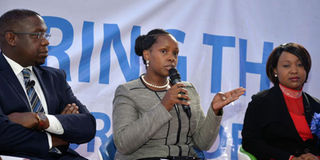Fight historical barriers for gender equality

From left: Nairobi Securities Exchange (NSE) chief executive officer Geoffrey Odundo, East African Breweries group legal director Wambui Kosgey and Techno Brain Group's global director of human resources Sarah Richson at an event on gender equality to commemorate the International Women’s Day at the NSE on March 3, 2016. PHOTO | SALATON NJAU | NATION MEDIA GROUP
What you need to know:
We encourage Kenyan women to work towards achievement of equality, and will continue working with the government and civil society to foster equality.
Together we will continue to be bold for change.
For more than 100 years, International Women’s Day has been marked the world over, yet it remains as important as the first day observed in New York in 1909.
Although many of the things the women who marched in New York in the early 1900s wanted have been achieved, in Kenya, in the European Union and in many other parts of the world, a reality check shows that there are still cultural and other barriers.
It is not good that women have a marginalised role in the labour economy, mostly in unpaid child care and household work. Although we are yet to realise the full benefits of gender parity, we recognise the importance of celebrating the gains made so far and the need to do more.
Last year, the European Commission published a fact sheet that showed there are still inequalities in employment, there are fewer women in the workforce, and a gender pay gap of an hourly pay difference between male and female employees across the entire European economy.
In Kenya and even in the European Union, there are fewer women represented in the boardrooms of large publicly listed companies. In the European Union, this trend is slowly being reversed, thanks to legislation, which is encouraging debate in several countries such as Italy, Belgium and France as well as voluntarily in business with clearly defined targets as in the United Kingdom. As of October 2015, women comprised only 4.3 per cent of chief executives, 6.6 per cent of board chairs and 22.7 per cent of members of boards of public listed firms in the EU. The EC noted that parity in national politics is more than three decades away, on average, and won’t be reached if some countries do not take determined actions.
GENERAL ELECTION
In Kenya, the women gearing up to run for posts in the August 8 General Election have reported intimidation and harassment. They are saying that a woman politician needs so much stamina to stand up as a candidate in the midst of obstacles, including cultural attitudes that confine them far from decision making. Women leaders have been working hard to consolidate gains made for their advancement, as seen in the progressive clauses of the 2010 Constitution, which are yet to be fully implemented. Last year, the EU adopted its policy document, “Transforming the Lives of Girls and Women through EU External Relations 2016-2020”, which aims to support partner countries achieve tangible results towards gender equality, improving women’s rights and mainstreaming gender equality in all sectors of development cooperation. The European Instrument for Democracy and Human Rights addresses all aspects of democratisation, including promoting and defending civil and political rights and gender issues. We are facilitating better participation of women in order to fulfil the constitutional two thirds gender rule. Nearly 1.9 million euros has been allocated to projects by four non-governmental organisations. EU member states have a strong consensus on the central role that gender equality and women’s empowerment play, not only as a means of poverty eradication, but also as a key driver of sustainable development and growth, and will continue to push for affirmative action. Discrimination and violence against women and girls remains one of the most widespread human rights abuses.
AFFIRMATIVE ACTION
Violence prevents women and girls from benefiting fully from health, education and other services; increases the risk of maternal death and vulnerability to HIV; and makes them more vulnerable to exploitation. The EU will continue to push for affirmative action and seek dialogue and cooperation with partners to ensure that the women’s agenda continues to be advanced.
We encourage Kenyan women to work towards achievement of equality, and will continue working with the government and civil society to foster equality, and together we will continue to be bold for change.
Stefano A. Dejak is the European Union Ambassador to Kenya.





